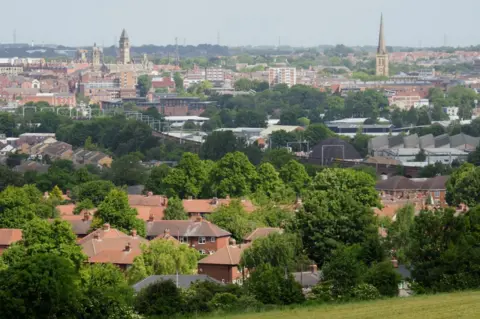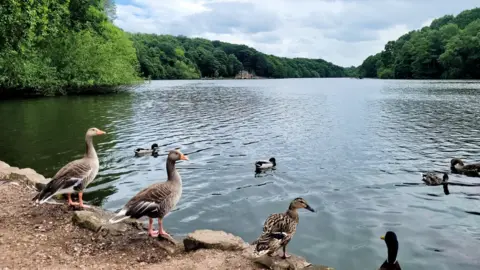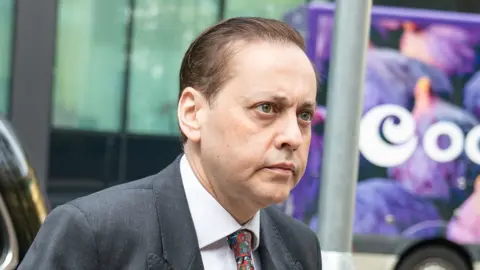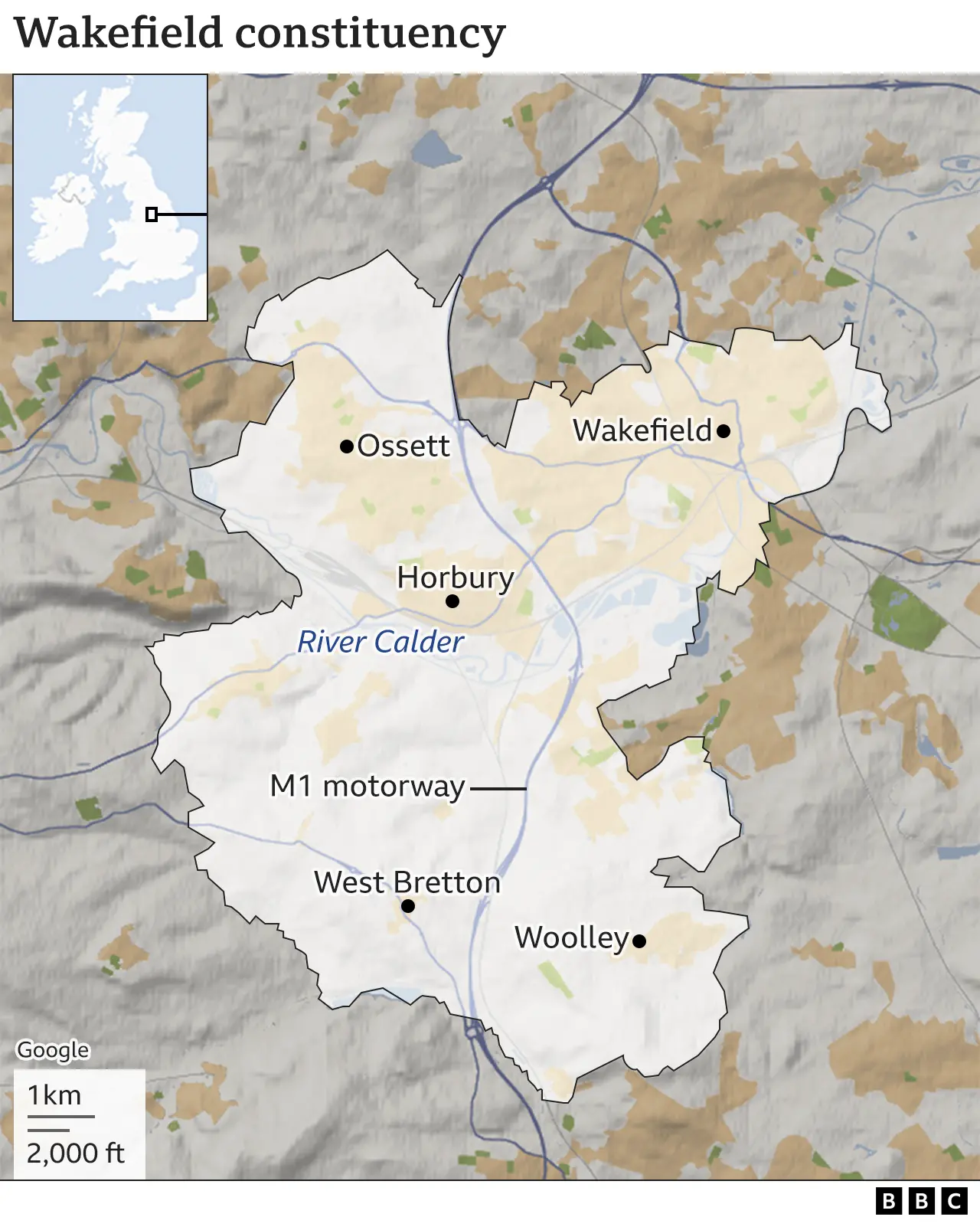By-election: Wakefield's particularly interesting ballot
 BBC
BBCAs voters in Wakefield prepare to head to the polls on Thursday, the result will be watched closely from Westminster. BBC Yorkshire Political Editor James Vincent has looked into the sometimes surprising history of the seat once seen as a Labour stronghold and what the result could mean for the main parties and, more importantly, the people of the constituency.
In political writing they often talk about the power of repetition.
So here we go…
This is a very particular by-election - happening for a very particular reason - happening at a very particular time.
And in this particular article, we'll start with why the 2019 election was such a shock.
Wakefield has, for most people's lifetimes, been a Labour city. Not since the Empire State Building was opened in New York 1931 had a Conservative MP been sent down to Westminster to represent this part of West Yorkshire.
In 1842 the first national trade union for miners was set up in Wakefield. Of course, looking back at the Miners' Association of Great Britain and Ireland's formation 180 years ago might not necessarily be that useful for guessing how people might vote in 2022. However, the National Coal Mining Museum is still tucked away in the bottom left corner of the Wakefield constituency. That heritage still means a great deal here.
To many, Wakefield was one of those places that would always vote Labour. I believe the phrase is "red wall". Although before 2019 no-one round here had ever heard, said or thought those words.
Wakefield was one of those constituencies that turned blue in 2019 and everyone sat up and noticed. But, if you look carefully, how big a shock was it?
Looking even further back than 1931, the Conservatives had been very successful in Wakefield. They'd been the dominant party. And if you look at the 88 years between 1931 and 2019, when the city had a Labour MP, the Conservatives were not that far behind.
In the 50s, 60s and 70s Labour regularly had a 10,000-vote majority. But in the 1983 general election it was cut to just 360. The biggest majority Labour enjoyed in recent history was more than 14,000 in 1997.
But the Conservatives were always in second.

I've talked about the city of Wakefield a lot here and most of the constituency's 69,000 voters do live there - but to the south west there is a big chunk of rural West Yorkshire.
Add to this some pretty tight majorities in the 2000s and, in Mary Creagh, a Labour MP who campaigned strongly against Brexit while her constituency voted strongly to leave. Her majority was just over 2,000 going into the general election of 2019. And the Conservatives knew they could take it.
These were just some of the particular reasons why it changed hands in 2019.
That December Imran Ahmad Khan became the new Conservative MP for Wakefield. He had been criticised for being "parachuted' into the constituency so he turned up to one debate in full skydiving jumpsuit.
In April this year he was convicted of sexually assaulting a 15-year-old boy in 2008. He was later jailed for 18 months.
While his trial was being prepared people in Wakefield were essentially without anyone to speak up for them in the House of Commons.
The Conservative Party suspended him as their MP as soon as he was charged, but he remained an independent MP until he resigned his seat after his guilty verdict. He says he will appeal his conviction.
It's not often you have a by-election because the last person elected is in prison - but as I said at the start that's why we're here: a very particular reason.
There's also partygate, Boris Johnson's fine and the cost of living. The government finds itself in a particularly tricky position.
 PA Media
PA MediaThere has been an interesting game of expectation management from both the Conservatives and Labour. Two senior Conservatives told me they don't really have a chance of winning here - Labour are also playing down how well they'll do.
Both party's candidates have faced tricky times already. There was a row over Labour's selection process, with a number of local members walking out as Simon Lightwood was picked to stand.
The Conservative candidate Nadeem Ahmed has said people can still trust his party after what happened with the last MP. He told The Telegraph: "We still trust GPs after Harold Shipman killed hundreds of people".
Unlike his boss in Downing Street, Mr Ahmed has recently lost a vote of no confidence. He was leader of the local Conservatives until last year - his colleagues decided they didn't want him any more.
Because of the very particular position voters find themselves in - how much do we read into the result?
If Labour win - but not by much - is that an open goal missed to punish the Conservatives? What will it say about Sir Keir Starmer's leadership? If the Conservatives win, what does that say about their support when their leader only has the backing of two-thirds of his own MPs? If they lose heavily, does that mean Boris Johnson's popularity as a vote winner up here is gone? Or will the party blame it on the previous MP?
How many votes will the other parties pick up from them as Labour and the Conservatives try and manage expectations?
How will the analysts look at this one? I'm afraid there are a lot of questions there. Skip forward to Friday 24th June if you want some of the answers.
But one problem will be solved; and it is the most important one.
People in Wakefield will finally have an MP to make sure their voices are heard in Westminster at this very particular time.


Below is the full list of candidates for the Wakefield byelection (listed alphabetically by surname):
- Nadeem Ahmed, Conservative Party
- Akef Akbar, Independent
- Paul Bickerdike, Christian Peoples Alliance
- Mick Dodgson, Freedom Alliance. Real People. Real Alternative
- Sir Archibald Stanton Earl 'Eaton, The Official Monster Raving Loony Party
- Jayda Fransen, Independent
- Jordan James Gaskell, UK Independence Party
- David John Rowntree Herdson, Yorkshire Party
- Therese Hirst, English Democrats
- Christopher Richard Jones, Northern Independence Party
- Simon Robert Lightwood, Labour Party
- Jamie Luke Needle, Liberal Democrats
- Ashley Theo Blue Routh, Green Party
- Ashlea Simon, Britain First
- Chris Walsh, Reform UK

